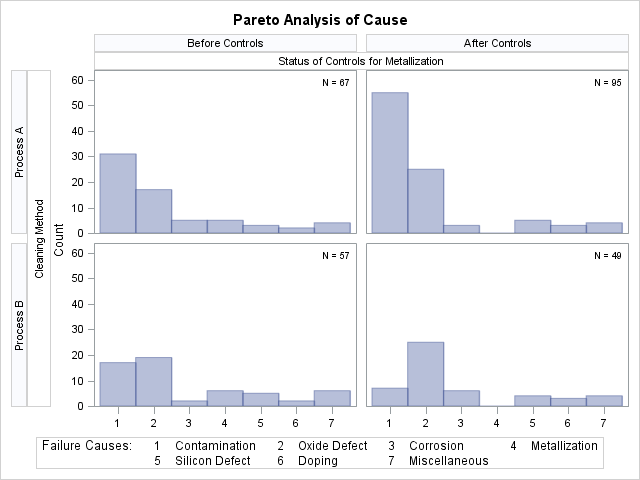The PARETO Procedure
- Overview
-
Getting Started

-
Syntax

-
Details

-
Examples
 Creating Before-and-After Pareto ChartsCreating Two-Way Comparative Pareto ChartsHighlighting the Vital FewHighlighting Combinations of CategoriesHighlighting Combinations of CellsOrdering Rows and Columns in a Comparative Pareto ChartMerging Columns in a Comparative Pareto ChartCreating Weighted Pareto ChartsCreating Alternative Pareto ChartsCustomizing Inset Labels and Formatting ValuesSpecifying Inset Headers and PositionsManaging a Large Number of Categories
Creating Before-and-After Pareto ChartsCreating Two-Way Comparative Pareto ChartsHighlighting the Vital FewHighlighting Combinations of CategoriesHighlighting Combinations of CellsOrdering Rows and Columns in a Comparative Pareto ChartMerging Columns in a Comparative Pareto ChartCreating Weighted Pareto ChartsCreating Alternative Pareto ChartsCustomizing Inset Labels and Formatting ValuesSpecifying Inset Headers and PositionsManaging a Large Number of Categories - References
Note: See Merging Columns in a Comparative Pareto Chart in the SAS/QC Sample Library.
This example is a continuation of Example 15.4 and illustrates a method for merging the columns in a comparative Pareto chart.
Suppose that controls for metallization were introduced on Wednesday. To show the effect of the controls, the columns for
Monday and Tuesday are to be merged into a column labeled Before Controls, and the remaining columns are to be merged into a column labeled After Controls. The following statements introduce a format named cntlfmt that merges the levels of Day:
proc format;
value cntlfmt 1-2 = 'Before Controls'
3-5 = 'After Controls';
The following statements create the chart shown in Output 15.7.1:
proc pareto data=Failure5;
vbar Cause / class = ( Process Day )
freq = Counts
last = 'Miscellaneous'
scale = count
catleglabel = 'Failure Causes:'
nocatlabel
nocurve
nlegend;
format Day cntlfmt.;
label Day = 'Status of Controls for Metallization';
run;
The levels of Day are determined by its formatted values, Before Controls and After Controls. By default, the order in which the columns are displayed is determined by the internal values. In this example, there are
multiple distinct internal values for each level, and PROC PARETO uses the internal value that occurs first in the input data
set.
